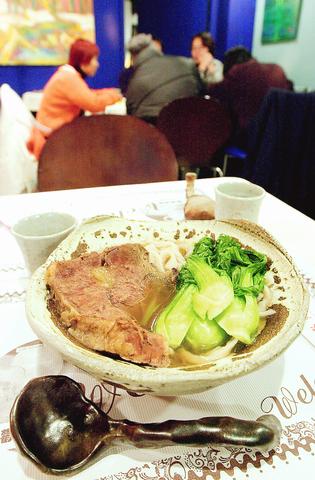Like its strange name, this restaurant is run by a strange guy with an obsession for beef noodles, wine and espresso coffee. Basically, these three items are the main fare at this small house -- a bizarre combination, but incredibly good taste.
The beef noodles here come in very big portions. The beef, unlike the three to five pieces of meat in most beef noodle places, is a large tenderloin. Accompanying the beef are thick, chewy pulled noodles in stock that's been simmering for a noticeable amount of time. Owner Yeh Ching-fang (葉清芳) has made his own bowls and spoons for you to use. The pottery is heavy, thick and solid, very much reflecting Yeh's artistic style. In fact, all the tableware is hand-made by Yeh.

PHOTO: CHEN CHENG-CHANG, TAIPEI TIMES
Yeh is truly romantic about his small eatery. He was a photojournalist for the China Times for 17 years, where he served as a correspondent in Hong Kong, Later he went to Paris to study painting. A few months ago he decided to quit the China Times and set up this quint restaurant in a narrow lane adjacent to a small temple on Roosevelt Rd. "This is a place where I can cook during the day, and do my painting at night," Yeh said. Currently, he's preparing for an exhibition in November.
The decor at the eatery is like a colorful playground, not an ordinary noodle house. The floor is a multi-colored pebble mosaic. At different corners of the house you can see dried roses casually hanging on the wall. And of course there are Yeh's paintings. By the entrance are two of Yeh's self-portraits. And in the middle there is a bold display of a man and woman making love in Yeh's own brand of abstract expressionism. Don't spill your noodles admiring this painting!
"I want to make people know that eating a bowl of noodles can be an enjoyable thing," said Yeh. He has two reasons to combine noodles with wine and espresso. First, they are his favorite tastes. "Also, having coffee and wine can make you stay a little bit longer, and chat a little more," said Yeh. Staying for a chat with Yeh has its advantages as he's likely to treat you to more wine and play his Rolling Stones or Tom Waits albums really loudly.
The house wine at Fang Fang is Pine Brook 1998, California, and only NT$60 a glass. And if you order the noodles and espresso as a set, then the coffee only costs NT$10. If you're not a fan of soup noodles, try Yeh's innovative pig leg dry noodles (乾拌豬手麵), which come in a fragrant peanut sauce with secret seasonings blended in.

June 9 to June 15 A photo of two men riding trendy high-wheel Penny-Farthing bicycles past a Qing Dynasty gate aptly captures the essence of Taipei in 1897 — a newly colonized city on the cusp of great change. The Japanese began making significant modifications to the cityscape in 1899, tearing down Qing-era structures, widening boulevards and installing Western-style infrastructure and buildings. The photographer, Minosuke Imamura, only spent a year in Taiwan as a cartographer for the governor-general’s office, but he left behind a treasure trove of 130 images showing life at the onset of Japanese rule, spanning July 1897 to

One of the most important gripes that Taiwanese have about the Democratic Progressive Party (DPP) is that it has failed to deliver concretely on higher wages, housing prices and other bread-and-butter issues. The parallel complaint is that the DPP cares only about glamor issues, such as removing markers of Chinese Nationalist Party (KMT) colonialism by renaming them, or what the KMT codes as “de-Sinification.” Once again, as a critical election looms, the DPP is presenting evidence for that charge. The KMT was quick to jump on the recent proposal of the Ministry of the Interior (MOI) to rename roads that symbolize

On the evening of June 1, Control Yuan Secretary-General Lee Chun-yi (李俊俋) apologized and resigned in disgrace. His crime was instructing his driver to use a Control Yuan vehicle to transport his dog to a pet grooming salon. The Control Yuan is the government branch that investigates, audits and impeaches government officials for, among other things, misuse of government funds, so his misuse of a government vehicle was highly inappropriate. If this story were told to anyone living in the golden era of swaggering gangsters, flashy nouveau riche businessmen, and corrupt “black gold” politics of the 1980s and 1990s, they would have laughed.

It was just before 6am on a sunny November morning and I could hardly contain my excitement as I arrived at the wharf where I would catch the boat to one of Penghu’s most difficult-to-access islands, a trip that had been on my list for nearly a decade. Little did I know, my dream would soon be crushed. Unsure about which boat was heading to Huayu (花嶼), I found someone who appeared to be a local and asked if this was the right place to wait. “Oh, the boat to Huayu’s been canceled today,” she told me. I couldn’t believe my ears. Surely,